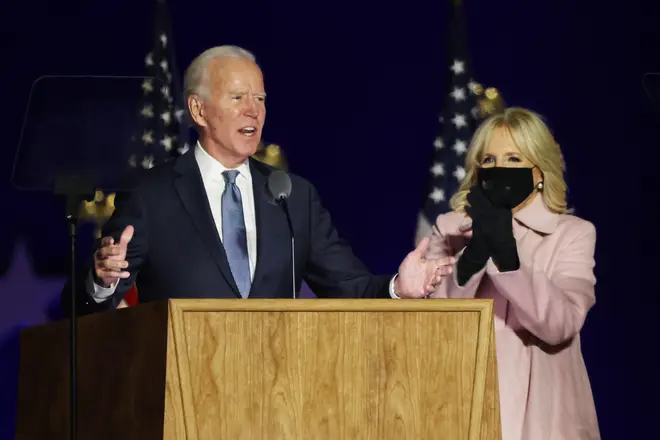
Ben Kentish 7am - 10am
4 November 2020, 09:14 | Updated: 4 November 2020, 15:07

US election: what will happen next?
The race to the White House is coming down to a handful of states as long counts and the possibility of legal battles create huge uncertainty.
Neither Donald Trump nor Joe Biden has the 270 electoral college votes needed to win, and millions of postal votes still need to be counted.
For both men, the path to the presidency hinges on six swing states, but Mr Biden can afford to lose more of those than Mr Trump.
The Rust Belt battleground states of Pennsylvania, Wisconsin and Michigan are central to the outcome, while the southern states of Georgia and North Carolina could also prove critical.
Read more: Follow our latest updates on the US election live
Another important battleground, Arizona, is set to be declared for Mr Biden.
This means he would have to win two of Pennsylvania, Wisconsin and Michigan to secure victory, even if he loses Georgia and North Carolina.
For Mr Trump, Pennsylvania is vital if he is to avoid defeat. If he loses there, he must win all of Wisconsin, Michigan, Georgia and North Carolina to stay in the White House.
Crucially, as things stand, Mr Biden leads in Wisconsin and has moved ahead Michigan.

Trump claims 'election victory' and 'will go to the Supreme Court' to stop counting
Mr Trump is ahead in Pennsylvania but many postal votes are still to be counted, and has narrow leads in Georgia and North Carolina.
The state of Nevada, where counting is also still ongoing, looks set to go to Mr Biden.
Postal votes still being counted
Democrats typically outperform Republicans in postal voting, while Republicans look to make up ground on polling day. A historically large number of postal votes flooded in across the country prior to the election.
Postal votes have not yet been counted in Pennsylvania, Wisconsin and Michigan and election officials have warned these counts could take days.
Different states have different rules for how and when to count postal votes, with several allowing them to be accepted after polling day as long as they were postmarked by Tuesday.

Joe Biden tells America Democrats 'on track to win'
In Pennsylvania for example, ballots postmarked by November 3 can be accepted if they arrive up to three days after the election.
Because of this, there may not be a result for Wisconsin until tomorrow, while Pennsylvania and Michigan may not be declared until Friday.
Legal challenges afoot
The possibility of legal battles could throw the election into further chaos. Any legal challenges contesting the result and how it has been counted could take weeks.
Addressing the American people on election night with the result still far from certain, Mr Trump accused Mr Biden of trying to "steal" the presidency from him.

Mr Trump made accusations of a "fraud on the American nation", adding "we did win this election". There is no evidence of fraud.
He declared he will go to the Supreme Court to get vote counting stopped.
The Republicans have already laid the groundwork at the Supreme Court for an effort to exclude ballots that arrive after polls closed on Tuesday, with the focus on Pennsylvania.
Mr Biden, appearing earlier in front of supporters in Delaware, urged patience, saying the election "ain't over until every vote is counted, every ballot is counted".
"It's not my place or Donald Trump's place to declare who's won this election," Mr Biden said. "That's the decision of the American people."

Since the 2000 presidential election between Al Gore and George W Bush was decided by the Supreme Court, both parties have marshalled legal teams to prepare for the unlikely event that voting does not settle the contest.
This year, there is a near presumption that legal fights will ensue and that only a definitive outcome is likely to prevent them.
Mr Trump has already held the prized battleground state of Florida along with the other crucial swing states of Texas, Iowa and Ohio, where Mr Biden had made a strong play in the final stages of the campaign.
Mr Biden won several states where Mr Trump sought to compete, including New Hampshire and Minnesota.
But Florida was the biggest, fiercely contested battleground on the map, with both campaigns battling over the 29 electoral college votes that went to Mr Trump.